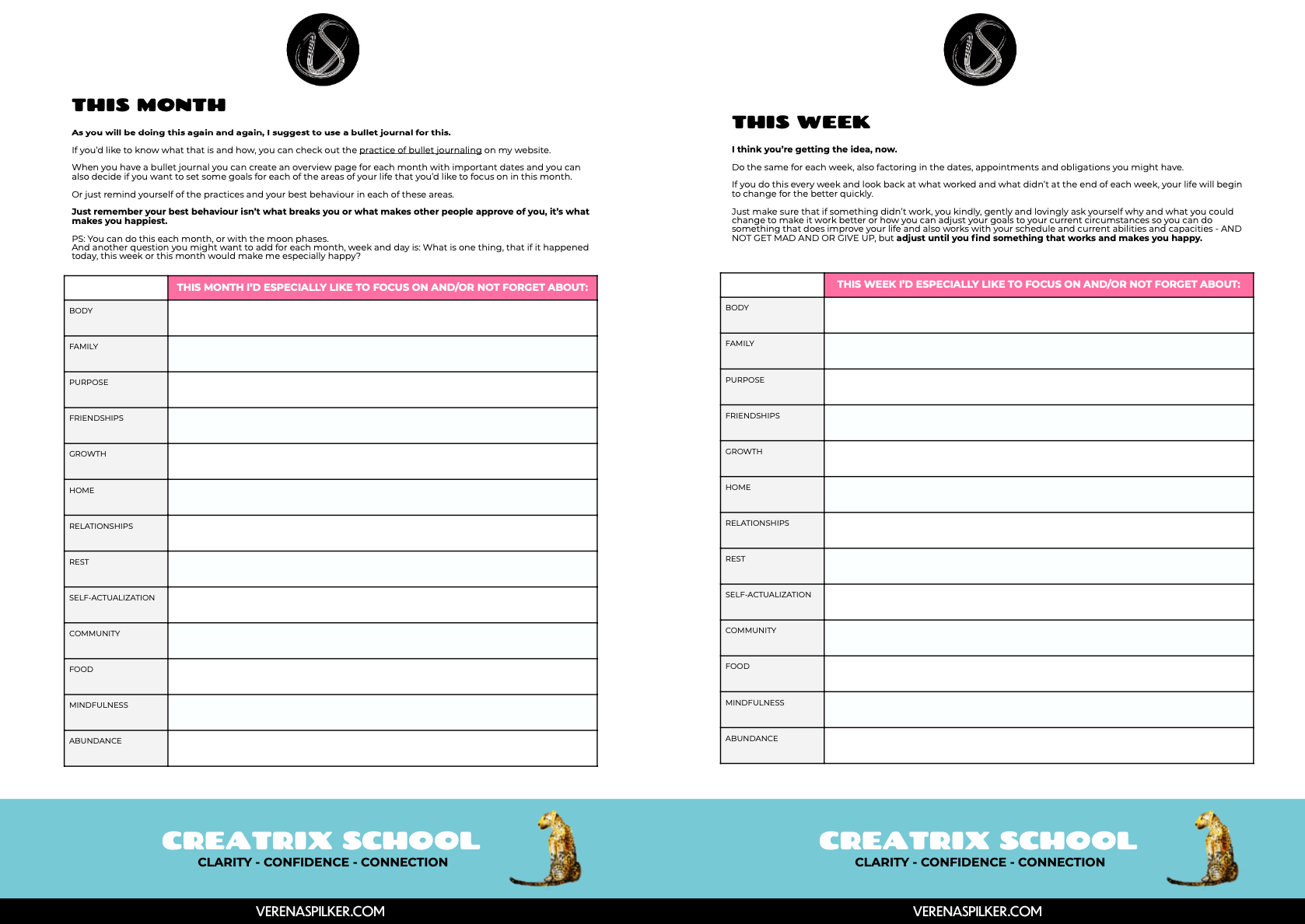Photo by MART PRODUCTION on Pexels.
← CHAPTER OVERVIEW
What are you doing today? And tomorrow?
How are you spending your days?
Do you live them purposefully?
Do you enjoy your days?
Do you get everything done that you wish to get done?
Do you have a plan about how you want to live your life?
Are you able to not stress and rush yourself?
Do you know when is the right time to do things best?
This month, we speak and think about self-actualization in the CREATRIX School, and we began this by thinking about what the most important things are, that we’d like to do in this life-time, so we can make sure to create time and space for them.
Then we learned what it takes to reach any goal, whether that’s personal or political.
Now, this week, we are looking to create our days so that we can actually follow through with what we wish to achieve and experience and enjoy each day.
And to help with that, I created a checklist, which you can download here.
But I would also like to invite you and encourage you to use this as an inspiration to create your own lists.
Because we are all different, and we all have different needs. What I might need right now might not be what’s best for you right now, and vice versa.
So have a look, use it if it suits you or change it however you see fit.
Just make sure you stick with one version for a while to see the effects of what you are doing, as these might not show right away but only over time.
See what effects your new routines have on your life, and then think about if this is creating the changes you want.
Once you see the effects, you might be better able to tell and judge what you want more or less of, and it might be wise to only adjust and change things again once you do.
Why is this useful?
What I see happening all the time is that people want to be changed, they want to be different, but they don’t allow themselves to find out what that means for them, as an individual person, and they don’t allow themselves to try different things to get there.
Imagine you wanted to build a car, from scratch.
Now, somebody might be gracious enough to put all the pieces and tools you need right in front of you, and they might even hand you all the instruction manuals, but then they leave you alone to figure out how to build a car by yourself.
How long is it going to take you to build that car?
It will surely be a lot faster when you have a very clear image of what that car is going to look like when it’s put together correctly.
If you don’t have that and try to figure out how to build the car just by putting the pieces together you have in front of you, it’s going to be really difficult.
(Which is why, in the CREATRIX School, we start by creating a strong image of who we want to be, our goals, and what’d we’d like to achieve, before we start – it makes everything else easier.)
How long it’s going to take you to build this car, even if you have the image, though, is still going to depend on the knowledge you have in this field already, or how well you can transfer knowledge you have in other fields to this.
It also depends on whether you believe in yourself enough to do it or not.
And then it depends on your level of stubbornness and whether you feel like it’s really worth the effort.
But learning this way, and figuring out your own unique way of building that car, can get you to your goal, and it might be quicker than learning from someone the traditional way, as you might also discover some shortcuts or improvements, when you’re fully open and concentrated and your vision is not limited by someone who tells you how it’s done or how to do it their way.
You might break a few pieces, you might have to start over again and again, but you can get there, and you will feel incredible once you’ve reached your goal and built that car – in your own way.
And while the first time will take you a long time, every time you do it after, it will be easier, and you’ll get better and faster at putting the car together.
Or, in the process, or, when you’re done, you might realize that you never want to do this again.
And that’s equally good to find out, as it allows you to stop fantasizing about how much better your life would be if only you knew how to put together a car.
Now, the traditional way of learning how to put together a car, would probably take you some years.
You would watch somebody else do it and then copy what they do, to learn.
You’d first learn how to put together the easier things, then the harder parts and eventually, once someone else has judged your progress, you will be allowed to learn the next steps.
Both methods are equally valid, and each might work better or worse for some people, depending on their preferred or inherent way of learning and seeing the world.
But whichever way we choose to reach our goal, we would not expect anyone to be a master before they have even tried, or to get it all right on the first trial.
Occasionally, there might be someone who has done exactly this in a past life, and they have conscious or unconscious memory of this, so it’s a lot easier for them than for other people.
Yet still, they first have to try it to find out about that, and if you are not that person, then that’s OK because only because someone else already knows how to do something in this life, doesn’t mean they didn’t have to learn it the hard and exhausting way the first time they tried in a past life as well.
And even if you don’t believe in past lives, if you give up or don’t try something just because someone else is faster or knows how to do it already, then it’s still your loss, no one else’s.
So, no matter where we are right now, the only thing that stands between us right now and being a master at something, is whether we are willing to invest what it will take us (not somebody else) to become a master at whatever we chose to do.
And there is no way around that.
We can wish all day long that we could already do something, that we would already be different, when what we really have to do is roll up our sleeves, try, fail and start again, as many times as it will take us to eventually be able to do it.
And the sooner we start, the sooner we will get there.
Now, why am I saying this?
Because people don’t want to schedule in a lot of the things that ‘should come to us naturally’ like being loving and welcoming and being grateful and doing something for others every day and so on.
Or even self-care habits, like drinking enough water, going to bed on time, eating at the times we decide are best for our well-being and so on.
But the thing is, if we are not used to doing these things, if this is not something we have learned already, we have to learn this, just like we would have to learn how to build a car before we can do it.
And then, only then, once whatever change we wish to integrate into our lives has become second nature, we won’t need to have them on our checklist any more (but then we might be able to replace them with new ones, to see what else might be possible).
So let’s get started on our lists, so we can live the lives we want to live.
And remember, you are right and perfect and wonderful exactly where you are and how you are.
If you start with just one thing on your daily checklist, that is as good as if you have 5 things or 20.
Go with something that feels doable, and once you have integrated the first thing, add another.
And remember, the kinder you are to yourself, the easier it will be.
If you forget one day, just continue the next day, no harm done, but every day you do do it, you win something.
And repeat.

















0 Comments